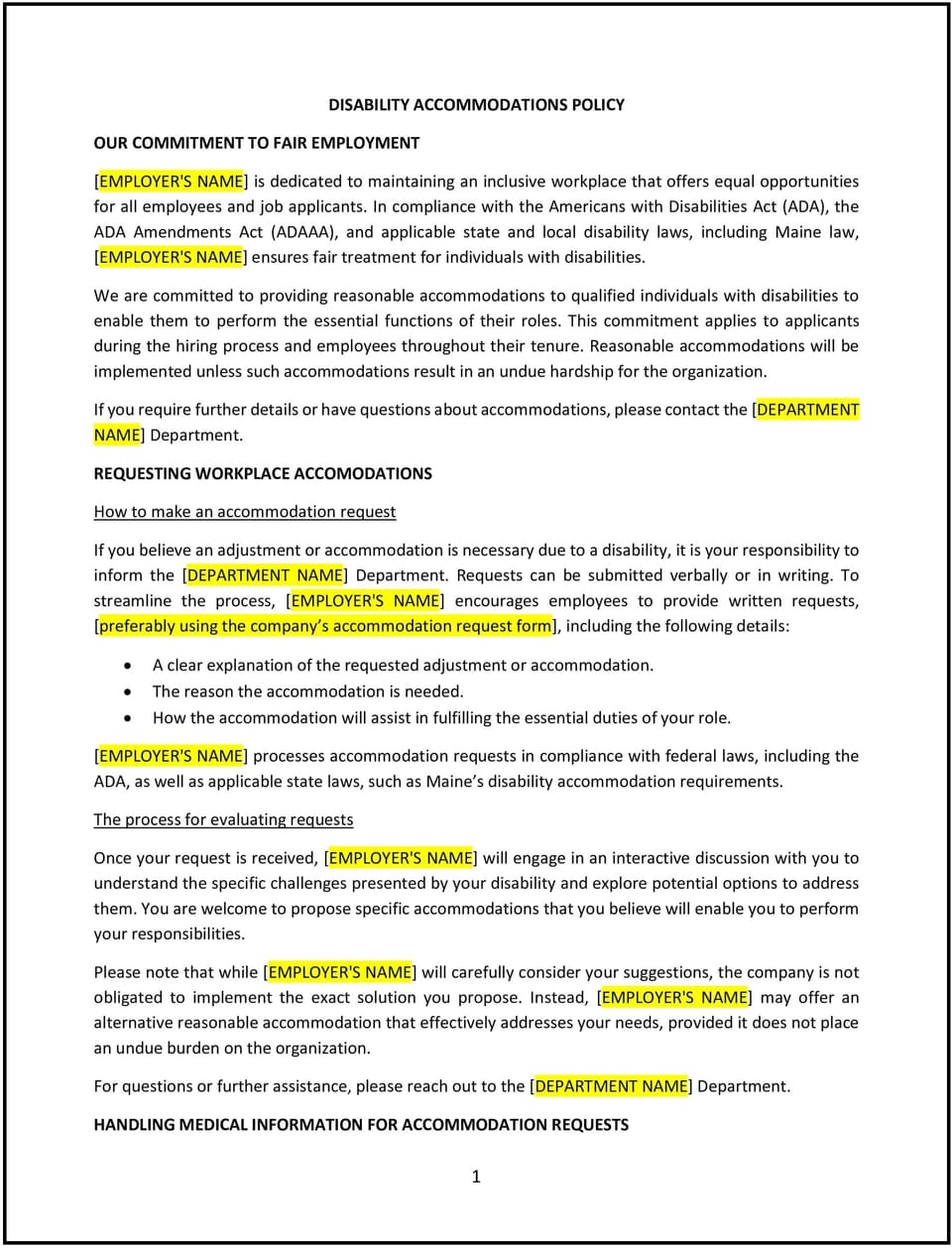Disability accommodations policy (Maine): Free template

Disability accommodations policy (Maine): Free template
This disability accommodations policy is designed to help Maine businesses provide a supportive and inclusive workplace for employees with disabilities. It outlines procedures for requesting accommodations, assessing needs, and implementing solutions to support compliance with Maine and federal disability laws, including the Americans with Disabilities Act (ADA).
By implementing this policy, Maine businesses can promote equal opportunities, enhance workplace diversity, and reduce the risk of discrimination claims.
How to use this disability accommodations policy (Maine)
- Define accommodations: Specify what qualifies as a reasonable accommodation, such as modified work schedules, assistive devices, or accessible workspaces.
- Outline the request process: Provide clear steps for employees to request accommodations, including whom to contact and what information to provide.
- Establish assessment procedures: Detail how requests will be evaluated, including discussions with employees and, if necessary, medical documentation.
- Include implementation guidelines: Specify how accommodations will be implemented and monitored to ensure effectiveness.
- Address confidentiality: Ensure all disability-related information is handled with confidentiality and shared only on a need-to-know basis.
- Prohibit retaliation: Clearly state that employees will not face retaliation for requesting accommodations or raising concerns about accessibility.
- Review regularly: Update the policy to reflect changes in Maine laws, ADA regulations, or workplace needs.
Benefits of using this disability accommodations policy (Maine)
Implementing this policy provides several benefits for Maine businesses:
- Enhances inclusivity: Promotes equal opportunities for employees with disabilities, fostering a diverse and supportive workplace.
- Ensures compliance: Aligns with Maine and federal disability laws, reducing the risk of legal issues.
- Improves retention: Supports employees in performing their roles effectively, enhancing job satisfaction and loyalty.
- Builds a positive culture: Demonstrates the business’s commitment to fairness, diversity, and respect.
- Reduces risk: Minimizes potential discrimination claims by providing clear processes for accommodations.
Tips for using this disability accommodations policy (Maine)
- Train managers: Equip supervisors with knowledge of ADA requirements and best practices for handling accommodation requests.
- Foster open communication: Encourage employees to discuss accommodation needs without fear of stigma or retaliation.
- Maintain documentation: Keep detailed records of accommodation requests, assessments, and implemented solutions.
- Monitor effectiveness: Regularly review accommodations to ensure they meet employee needs and adjust as necessary.
- Provide resources: Make information about accommodations and disability rights readily available to employees.
- Stay informed: Monitor updates to Maine disability laws and ADA regulations to ensure ongoing compliance.
Q: What qualifies as a reasonable accommodation under this policy?
A: Reasonable accommodations may include adjustments like flexible schedules, accessible workspaces, assistive technologies, or job duty modifications.
Q: How can businesses ensure compliance with Maine disability laws?
A: Businesses should provide training, document accommodation processes, and regularly review their practices to align with state and federal requirements.
Q: How should businesses handle accommodation requests?
A: Businesses should promptly evaluate requests, engage in interactive discussions with the employee, and implement reasonable solutions based on their needs.
Q: How often should businesses review their disability accommodations policy?
A: Businesses should review the policy annually or whenever there are changes to Maine disability laws or ADA regulations.
Q: What steps should businesses take to protect confidentiality?
A: Businesses should limit access to disability-related information to authorized personnel and store records securely.
Q: What actions can businesses take if an accommodation is no longer effective?
A: Businesses should work with the employee to reassess their needs and implement a new accommodation that meets both the employee’s and the business’s requirements.
Q: How can businesses foster a culture of inclusivity?
A: Businesses can provide training, promote open dialogue about disability rights, and actively demonstrate their commitment to diversity and support.
This article contains general legal information and does not contain legal advice. Cobrief is not a law firm or a substitute for an attorney or law firm. The law is complex and changes often. For legal advice, please ask a lawyer.


